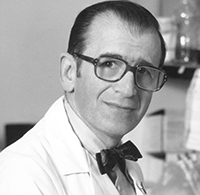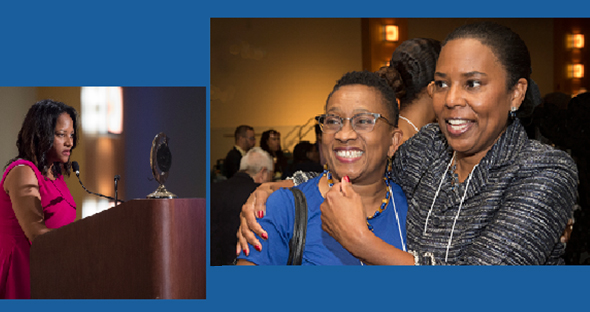Winter 2017

Raul Ruiz (Res ’06) was 17 when he banged out a contract on a manual typewriter, polished his dress shoes, borrowed a briefcase, and bought an itchy navy suit two sizes too big. “I wanted one to grow into as an investment for medical school interviews,” he explains.
Then he proceeded to walk door-to-door in the hot desert sun, talking to business owners and store clerks alike. In exchange for his neighbors’ financial support, Ruiz stipulated that he would earn an MD and return to his underserved Southern California community. “This was my life goal and mission,” says Ruiz, now 44. “I was inviting people to invest in their future.”
Ruiz and his neighbors have continued building on that youthful bond. A board-certified emergency doc, Ruiz was elected to the U.S. House of Representatives in 2012, when the political neophyte unseated seven-term incumbent Mary Bono.
Ruiz never aspired to elected office, but for a kid raised in a trailer and coached to offer solutions, not complaints, the trajectory seems inevitable. Born in Mexico, Ruiz was reared by an aunt and uncle, migrant farm laborers who worked the fields of California’s Coachella Valley. The family couldn’t afford health insurance, yet that wasn’t the biggest obstacle to accessing medical care. The region had just one doctor for every 9,000 residents. No matter where Ruiz turned, it was hard to miss the desperate medical needs of his neighbors in the low-income, predominantly agricultural, and increasingly Latino community.
With pledges of support from his neighbors plus $2,000 in hand, Ruiz attended UCLA, graduated magna cum laude, and earned three graduate degrees from Harvard (an MD, as well as master’s degrees in public policy and public health). He did a few stints abroad as a public health worker in Mexico, El Salvador, and Serbia; trained in emergency medicine at Pitt; and returned home in 2007.
On his first overnight shift in the Coachella Valley’s Eisenhower Medical Center emergency department, he had six patients in respiratory distress, all of whom had to be intubated and stabilized. “I was so thankful that night for my Pitt mentors and professors,” he says. “I chose emergency medicine because the emergency department is the true safety net of our nation—it’s open 24/7 and required by law to take care of anyone with a life-threatening illness or severe emergency, regardless of their ability to pay, where they’re from, or their background.”
He kept busy off-hours, too. He rose to the rank of senior associate dean of community engagement and partnerships at the University of California, Riverside School of Medicine, and founded the Coachella Valley Healthcare Initiative. He also founded a premed mentorship program, Future Physician Leaders, for aspiring docs intent on practicing in their underserved home communities. He helped open a free primary care clinic and served with the nonprofit Flying Doctors of America. “My heart and soul was in the community,” he says, “with my patients, with the people in the greatest need for health care and facing the greatest barriers.”
Having long grappled with the profound effects of factors like income, race, and educational status on his patients’ health outcomes, Ruiz felt that a run for Congress seemed the best next step. A member of the House Energy and Commerce Committee, he’s made affordable health care, veterans’ services, and transparency his priorities.
“When we live in a society that is healthy and productive, we all benefit,” he says. “The bottom line of a health care system is to produce a healthy population. That’s how we should measure our success in health care.”
Henry Shoenthal
Pastoral Rounding
BY KRISTIN BUNDY

In a borrowed van, 13 Pitt Med students bumped along the back roads of a 120-acre apple orchard last spring. “The funniest moment was figuring out who was going to sit on whose lap,” says Henry Shoenthal (MD ’72). “We didn’t have enough room for everyone to have a seat.”
That kind of community spirit is the reason Shoenthal, a family physician in his hometown of New Paris, Pa., loves what he does and where he does it. Having practiced in this area for 45 years, he’s now on a mission to entice more physicians to greener pastures. Or to pastures at least.
Of his practice, he says,“I usually don’t have to ask for a family history because, in many cases, I already know it,” he explains. The population of New Paris is less than 200 people. Many of his patients have roots in the region that date back decades or even centuries. Shoenthal’s own family has been here since 1868.
Shoenthal speaks of a vibrant social life at a more relaxed pace and a comparable salary to his urban peers. “People think they can make more money in the city, but to recruit people here, you have to pay the same as in urban centers.”
Lifestyle benefits aside, Shoenthal says there’s an urgency for more physicians in the countryside. “Rural America is suffering. Right here in Bedford County, there are only about 15 of us practicing pediatrics, family practice, and internal medicine—and half are over 55.” Part of his outreach this year involved hosting Pitt’s student-run Rural Medicine Interest Group, which included the orchard tour, as well as a visit to his office.
Grace Lisius, second-year med student and coordinator of the spring field trip, was attracted by the prospect of a rural practice. “I have a healthy appreciation for the outdoors that doesn’t always go together with medical school. It seemed like Dr. Shoenthal had a really great setup, owning land and being part of a community that he [has followed] for generations.”
Drawing on the students’ enthusiasm, Shoenthal established an endowed fund to offer perpetual support for rural health education. Shoenthal tells students, “Don’t give up on rural areas. Think about it.”
TOAST WITH THE MOST
On Friday, Sept. 8, the medical school and the UPMC Physician Services Division hosted A Toast to Diversity and Call to Action at the Heinz History Center. Pitt Med students, faculty, and staff attended the event. PICTURED LEFT: Kia Washington (Fel ’08, Res ’11, Fel ’12), assistant professor of plastic surgery (who investigates whole eye transplants), was among the speakers. RIGHT PHOTO: Paula Davis, assistant vice chancellor for health sciences diversity, poses for a photo with Esa Davis (no relation!), associate professor of medicine and of clinical and translational science.
Philip Troen
Nov. 24, 1925–Sept. 1, 2017
Philip Troen was left-handed, but when he got in front of a classroom to teach, he’d hold the chalk with his right hand, says his son, Bruce Troen, chief of geriatrics and  palliative medicine at the University at Buffalo. “If you write with your left hand at the board, you’re often covering what you’ve written,” Troen had explained to his son. It was just one example of the practical, deliberate nature of the Pitt retired assistant dean and physician-in-chief emeritus. Philip Troen died in September.
palliative medicine at the University at Buffalo. “If you write with your left hand at the board, you’re often covering what you’ve written,” Troen had explained to his son. It was just one example of the practical, deliberate nature of the Pitt retired assistant dean and physician-in-chief emeritus. Philip Troen died in September.
 palliative medicine at the University at Buffalo. “If you write with your left hand at the board, you’re often covering what you’ve written,” Troen had explained to his son. It was just one example of the practical, deliberate nature of the Pitt retired assistant dean and physician-in-chief emeritus. Philip Troen died in September.
palliative medicine at the University at Buffalo. “If you write with your left hand at the board, you’re often covering what you’ve written,” Troen had explained to his son. It was just one example of the practical, deliberate nature of the Pitt retired assistant dean and physician-in-chief emeritus. Philip Troen died in September.Born in Portland, Maine, Troen left his hometown at age 15 to attend Harvard College for his undergraduate studies and medical education. He joined Pitt Med in 1964 as professor of medicine and chief of medicine at what’s now UPMC Montefiore, beginning a 50-year career in which he shaped medical education at Pitt.
One of Troen’s Montefiore interns from 1975, E.J. Donnelly (Res ’78), now a retired internist, remembers the “morning report,” when they’d sit at a round table and present cases. “That was a great learning experience. … He asked excellent questions.”
Troen copiloted the integrated case studies course at Pitt Med in 1992, introducing students to mock patient cases. Paula Clemens—professor of neurology, microbiology and molecular genetics, pediatrics, and human genetics—led the course with Troen and says his commitment to the scholarly process stuck with her as a teacher of med students. “He had a willingness to accept all that it took to develop clinicians.”
After becoming assistant dean of medicine in 2004, Troen led the design and implementation of the Scholarly Research Project, now a model for medical schools seeking to integrate research into their curricula.
Arthur Levine, senior vice chancellor for the health sciences and John and Gertrude Petersen Dean of the University of Pittsburgh School of Medicine, says Troen was a skilled educator with an “infectious” passion for science. The med school’s Philip Troen, MD, Excellence in Medical Student Research Mentoring Award recognizes a faculty advisor who excels at leading students through their Scholarly Research Projects. —Evan Bowen-Gaddy
-----------------------------------
Robert Wilkins
Aug. 18, 1934–March 31, 2017
When Robert Wilkins (MD ’59) got married over Christmas break in 1957, he asked Pitt Med classmate Robert Horsch (MD ’59) to stand beside him. Horsch was proud to  serve as the best man for a friend with “a great mind” and “keen sense of humor that would pop out every once in a while.” The bride, Gloria, remembers Wilkins’s humor a bit differently. “He liked a bad pun better than good pun,” she quips.
serve as the best man for a friend with “a great mind” and “keen sense of humor that would pop out every once in a while.” The bride, Gloria, remembers Wilkins’s humor a bit differently. “He liked a bad pun better than good pun,” she quips.
 serve as the best man for a friend with “a great mind” and “keen sense of humor that would pop out every once in a while.” The bride, Gloria, remembers Wilkins’s humor a bit differently. “He liked a bad pun better than good pun,” she quips.
serve as the best man for a friend with “a great mind” and “keen sense of humor that would pop out every once in a while.” The bride, Gloria, remembers Wilkins’s humor a bit differently. “He liked a bad pun better than good pun,” she quips. After Robert and Gloria (EDUC ’58) earned their Pitt degrees, they moved near Duke University, where Wilkins completed his internship and residency. He later became professor and chief of neurosurgery there, a post he held for 20 years.
Wilkins started a new journal for the Congress of Neurological Surgeons in 1977. He and Gloria worked together in their North Carolina bedroom—Wilkins editing, Gloria typing—to put together Neurosurgery, what, today, is the top-rated journal in the field, says Allan Friedman, Duke’s Guy L. Odom Professor of Neurological Surgery. Wilkins was internationally known for his scholarship, Friedman notes, publishing more than 300 papers and the three-volume textbook Neurosurgery. Gloria was “clearly a partner” in his medical career, Friedman adds.
After Wilkins’s 50th Pitt Med reunion, the duo established the Robert and Gloria Kohl Wilkins Student Resource Fund at Pitt.
“There’s no one [else] in our class … that achieved what he achieved academically in the field of neurosurgery,” says Horsch. —EBG

